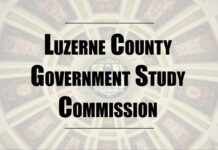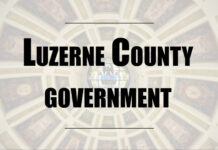Council determined to whittle down proposed tax hike
Luzerne County Council members expect county Manager Randy Robertson to recommend a real estate tax hike in the proposed 2023 budget he presents to council Tuesday.
“I do believe there will be a proposed tax increase built into the budget that he brings to us,” said council Chairwoman Kendra Radle. “I obviously want to work hard to minimize or eliminate a tax increase, but there are a lot of issues that we face at this point in time.”
Radle cited five new union collective bargaining agreements, inflation and increasing pressure to fix county-owned roads and address resources needed to deliver essential, mandated services.
“I’m interested to see the budget that the manager proposes to council,” Radle said.
Robertson, who became the county government overseer in June, said he has been hit with a growing list of demands to fund needs that have been festering, including the replacement of aging snow plows and repair of elevators and other equipment.
He declined to publicly get into specifics, including any tax increase percentage, saying he believes council would prefer to have the opportunity to hear the final presentation first and not through advance speculation in the media.
Council is free to make changes before the Dec. 15 budget adoption deadline, and a majority of council members already are saying they don’t plan to support any tax increase.
The maximum allowable increase would be 8% under the county’s home rule charter.
An 8% increase would generate approximately $8.4 million in additional revenue, which means each percentage yields about $1.05 million.
County taxes are currently 6.1696 mills, which equates to a bill of $616.96 on a property assessed at $100,000. (A mill is $1 tax for every $1,000 in assessed value.)
A breakdown how much more the owner of a $100,000 property would pay per year under various tax increase scenarios: 1%, $6.17; 2%, $12.34; 3%, $18.51; 4%, $24.68; 5%, $30.85; 6%, $37.02; 7%, $43.19; and 8%, $49.36.
The last county tax increase was 3.25% in 2020 and charged $19 more annually on a $100,000 property.
This is the first county budget for six of the 11 county council members: Carl Bienias III, Kevin Lescavage, Vice Chairman John Lombardo, Matthew Mitchell, Brian Thornton and Gregory Wolovich Jr.
Proposed tax increases always prompt frustration and anger from some property owners, and letters of objection already have started coming to council.
“Please do not raise our taxes again,” citizen Marie O’Reilly wrote in an email public submission comment for Tuesday’s meeting.
“Senior citizens are bombarded with price increases in everything from groceries to utilities. Have a heart and do not keep us strapped more than we are. There is not enough room under the bridges for us to live,” O’Reilly wrote.
Wyoming resident Louise Gowran offered a similar plea in her submitted comment, also pointing to senior citizens unable to afford utility bills and food increases.
“I don’t understand why the tax has to be increased. Where does our money go?” Gowran wrote, citing the poor condition of roads.
Council feedback
Like Radle, all 10 of her colleagues say they are committed to dissecting the budget in upcoming public sessions.
Lombardo said he will assess all requests and understands the county’s challenges covering rising expenses when taxes have not been raised since 2020, but he is not in favor of a tax increase in the current economic situation.
While council can pick through each line item and compare the figures to prior years as usual, Lombardo encourages the administration to present other options of non-mandated expenses that can be cut to avoid an increase while making both council and the public aware of ramifications.
This approach would be worthwhile because it seems likely most council members are unwilling to raise taxes, he said.
“It’s just a bad situation no matter how you look at it,” Lombardo said.
Real estate taxes are the county’s largest revenue stream. The general fund operating budget fully or partially funds a range of services, including the prison, county court system, district attorney and public defender’s offices, 911, emergency management, the election bureau, the coroner and departments covering roads and bridges, planning and zoning and the filing of real estate deeds and wills.
“This is a big deal,” Bienias said of the budget decision before council.
Bienias said he will listen and keep an open mind but is determined to avoid a hike.
“My mindset going into it is I oppose any tax increase,” he said.
A synopsis of feedback from the others:
• Lescavage said he is unwilling to raise taxes because people are “hurting” due to inflation.
“I’m sure we can find the reductions we need,” he said.
• LeeAnn McDermott said her goal is no tax increase, but she also is unwilling to compromise the delivery of vital, mandated public services.
She would only consider the “bare minimum” increase if no other viable options are identified by council following a series of upcoming budget sessions.
“With inflation and heating and everything else going up, this is the worst time to be raising taxes,” she said.
• Tim McGinley, the lone Democrat on council, said he will reserve comment until he has an opportunity to review the manager’s presentation.
“Once I get a look at it, I will start to work on what I think is the proper funding for the county. There will be difficult decisions,” he said.
• Mitchell said department heads expressed their concerns and needs during recent group sessions, and some have serious issues.
“They have a lot of needs, but the timing couldn’t be worse. I don’t think it’s fair to ask taxpayers to shoulder more taxes when they have to pay more for everything else right now,” Mitchell said.
He wants to hear discussion about the minimum staff and resources needed to perform mandated services and what nonessential services may be altered to cut spending.
“Anything we can do to trim and get more lean would be ideal,” Mitchell said.
• Chris Perry said he is anxious to learn how the manager’s budget factors in new collective bargaining agreements, inflation, road repairs and measures to retain and attract employees to required vacant positions. He also is open to all proposals to cut or scale back non-essential services to help offset rising expenses.
“Obviously we have a lot of work to do,” Perry said.
• Thornton said he keeps hearing about needs but wants ideas to cut. He believes about half of vacant positions should be eliminated if that plan is not included in Robertson’s proposed budget.
He said he personally knows many county residents who are struggling to pay taxes on top of other expenses amid the highest inflation since the early 1980s.
“I’m not going to raise taxes in the county on these people,” Thornton said. “School boards also should look for ways to cut because they hardly ever hold the line, and school taxes make up the largest portion of real estate taxes.”
• Stephen J. Urban said he won’t vote for an increase and is confident there will be room to cut without jeopardizing services.
He said council provided raises in recent contracts to help with recruitment in some departments with high vacancies, and he supports defunding some vacant positions.
“I think the public expects us to tighten the belt up in 2023, since they’re as impacted by inflation as we are,” Urban said. “It’s going to be a hard budget, but we’ll get through it.”
• Wolovich said he is “most certainly not in favor of raising taxes” and will be diligently looking for any “glaring differences” compared to prior budgets.
“We do, of course, need to listen and discuss any pressing concerns that will impact both taxpayers and the functionality of our county government,” he said.
Budget meetings
Tuesday’s proposed budget introduction will be during council’s 6 p.m. voting meeting at the county courthouse on River Street in Wilkes-Barre.
Instructions to remotely attend are posted under council’s online meeting link at luzernecounty.org.
The first public budget hearing will be at 5 p.m. Oct. 18, followed by a work session focused on budgets for these offices: controller, solicitor, budget/finance, judicial services and intergovernmental.
A budget work session at 5 p.m. on Nov. 1 will concentrate on the district attorney’s office, court branches and correctional services.
A second required public budget hearing will be held at 5 p.m. Nov. 15, followed by a work session about the human services, general government and public defender’s office budgets.
Work sessions on the administrative and operational services budgets will follow council’s 6 p.m. voting meeting on Nov. 22.
Reach Jennifer Learn-Andes at 570-991-6388 or on Twitter @TLJenLearnAndes.




